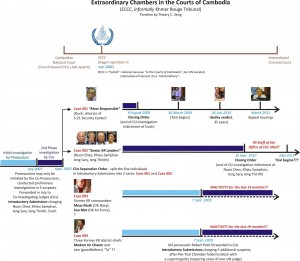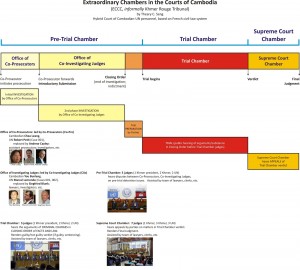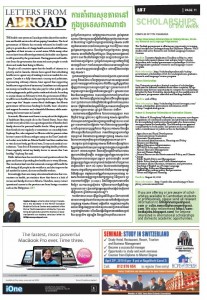- 33. As of 17 April 1975, the CPK was governed by a Statute which had been initially adopted at the Party’s first Congress, in September 1960.74 In January 1976, a new Statute75 was adopted at the Party’s Fourth Congress76 that outlined the ideology, membership, structure and organization of the Party. Within the Statute a number of state bodies were particularized: the Revolutionary Army of Kampuchea,77 the national system of Party Committees,78 the Party Central Committee,79 and “various offices and ministries surrounding the Central Committee”.80 The Party itself was governed by a Central Committee and a Standing Committee.81
Category Archives: Researches
Cambodia seeks clarification of 1962 ICJ judgment
29 Apr 2011
 As clashes with Thailand entered an eight day, Cambodia announced its submission to the ICJ regarding its 1962 decision to award it the 11th-century Hindu temple. Despite the almost fifty year old ruling, the problem over the ownership of a 4.6-square-km plot of scrub land surrounding the ruins has never been resolved, with both countries lay claim to the disputed area. The structure – one of the most celebrated example of Khmer architecture – has been the focus of strained relations between the neighbouring states, particularly since tensions it was granted UN World Heritage status in 2008.
As clashes with Thailand entered an eight day, Cambodia announced its submission to the ICJ regarding its 1962 decision to award it the 11th-century Hindu temple. Despite the almost fifty year old ruling, the problem over the ownership of a 4.6-square-km plot of scrub land surrounding the ruins has never been resolved, with both countries lay claim to the disputed area. The structure – one of the most celebrated example of Khmer architecture – has been the focus of strained relations between the neighbouring states, particularly since tensions it was granted UN World Heritage status in 2008.
The Ministry of Foreign Affairs and International Cooperation of Cambodia stated that the submission of the request was prompted by “Thailand’s repeated armed aggression to exert its claims to Cambodian territory, on the basis of its own unilateral map that has no legal basis”. It added that Cambodia also submitted a request to the ICJ to take conservatory measures, “in light of the repeated acts of aggression against Cambodian territory by Thailand’s armed forces”. “Cambodia considers conservatory measures as unavoidable for engendering a permanent ceasefire between the two countries, thus stopping the loss of lives and preserving the temple of Preah Vihear from serious damages, until the interpretation of the ICJ’ s 1962 judgment is finalised,” said the statement. A clarification by the court was of “the utmost necessity… in order to peacefully and definitely settle the boundary problem between the two countries in the area”.
Foreign ministry spokesman Koy Kuong stated “We especially want clarification about the vicinity around the temple. Thailand is using unilateral maps to claim our territory.”
Link: http://www.haguejusticeportal.net/eCache/DEF/12/567.TGFuZz1FTg.html
Some Justice for Cambodia
July 27, 2010
The New York Times
Editorial
It is disturbing that the Cambodian prime minister, Hun Sen, has said the court will not prosecute more suspects than the ones in custody. One has to ask, whom is he trying to protect?
Thirty years later, Cambodia’s “killing fields” are still haunting. A Buddhist memorial displays 5,000 haphazardly arranged human skulls — a tiny fraction of the 1.7 million Cambodians butchered by the Khmer Rouge.
While the world must never forget what happened, there is at least the beginning of justice. On Monday, a United Nations-backed tribunal convicted Kaing Guek Eav, known as Duch, of war crimes and crimes against humanity — the first major Khmer Rouge figure to be tried since the regime was overthrown. He has already spent 16 years in prison, and the tribunal sentenced him to another 19 years.
Duch oversaw a notorious prison where more than 14,000 people were tortured and killed. During an eight-month trial, he admitted to many of the charges against him. His defense — he was a “cog in a machine” — is no defense at all.
We understand why many of the victims of the Khmer Rouge and their families were disappointed that he was not given life in prison. He should never taste freedom, but at least he was held to account and he will be 86 years old when his sentence is served.
Continue reading
Health-Care System in Canada
Letters from abroad

The health-care system in Canada provides almost free medication and health services for all tax-paying Canadians. The local government of Alberta has recently reformed its health-care policy to provide free-of-charge health services for all Albertans, regardless of their income or social status. While many other sectors have been effectively privatised, the health-care System is still operated by the government. Having guaranteed health-care from the government has attracted more people to settle down and make their living in Alberta.
People in all countries agree that the health of citizens is a priority, and in Canada, citizens have agreed that subsidising healthcare is a great way of making it more accessible for everyone. Canada is a fully democratic country and politicians, representing ordinary citizens, have agreed that supporting healthcare is a good use of tax money. Canadians not only spend tax money on healthcare; they also pay for other public goods such as playgrounds, public parks, roads and schools. According to a news release on February 9, 2010, the government of Alberta will focus on healthcare as the priority in its 2010 budget. The report says that “despite current fiscal challenges, the Alberta government will increase funding for health, basic education and support for seniors and vulnerable Albertans, while maintaining the lowest taxes in Canada”.
As a result, Albertans won’t have to worry about the high price of healthcare like people do in the United States. Since they needn’t worry about the cost, a growing number of families have family doctors for personal health checks. Many people visit their family doctor regularly or sometimes on a monthly basis. Sopheap Ros, who migrated to Alberta with his parents when he was 3-years-old from a refugee camp on the Thai-Cambodian border, now holds an Alberta Health Card that enables him to visit doctors freely, get blood tests, X-rays and medical consultations. “I am free of frustration regarding health problems. I have regularly visited my family doctor to ensure that I am healthy,” Sopheap Ros said.
Continue reading



